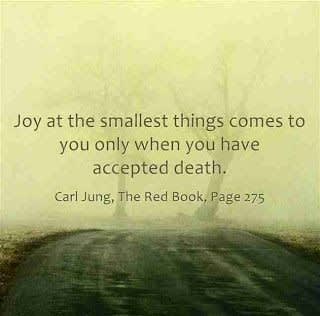
些細なことでも喜びを感じるのは、死を受け入れたときだけです。
死を受け入れたときに初めて、小さなことにも喜びが生まれる。カール・ユング『赤の書』275ページ
Joy at the smallest things comes to you only when you have
accepted death. Carl Jung, The Red Book, Page 275
A
インタビュアー: 死はすべての終わりであると信じている人が多い中で、それを可能にするために、後世の人々にどのようなアドバイスをされますか?
カール・ユングです。私は多くの老人を診てきましたが、彼らの意識が、明らかに完全な終わりに脅かされているという事実に対して何をしているかを見るのはとても興味深いことです。意識はそれを無視します。人生はあたかも続いているかのように振る舞います。だから私は、年寄りは生き続ける方がいいと思う。まるで何世紀も過ごさなければならないかのように、次の日を楽しみにして、ちゃんと生きる。でも、怖くて前を見ないで後ろを見ていると、石化して体が硬くなり、早死にしてしまう。しかし、これから始まる大冒険を楽しみにして生きているときは、生きている。無意識が意図していることは、そんなところにある。もちろん、人はいずれ死ぬものであり、それがすべての悲しいフィナーレであることは明白ですが、それでもなお、私たちの中にはそれを信じられないものがあるようです。しかし、これは単なる事実であり、心理的な事実である。それが何かを証明するという意味ではありません。単にそうなのである。例えば、私はなぜ塩が必要なのか分からないかもしれませんが、私たちは塩も好んで食べるのです、なぜなら気分が良くなるからです。そして、ある方法で考えると、かなり気分が良くなるかもしれません。そして、自然に沿って考えれば、適切に考えることができると思うのです。
"死の冷たさ "がないと、よく見えない。生きることも死ぬことも、始まることも終わることも望んでいる。あなたは永遠に生きることを強制されているわけではありません。しかし、あなたの中には両方の意志があるので、死ぬこともできます。生と死は、あなたの存在においてバランスを取らなければならない。今日の男性は、あまりにも多くの正しくないものが生きていて、あまりにも多くの正しいものが死んでいるので、大きな死のスライスが必要です。バランスを保っているものは正しく、バランスを崩しているものは正しくない。しかし、バランスがとれていれば、それを維持するものは正しくなく、それを乱すものは正しいのである。バランスは同時に生であり、死でもある。生の完成のためには、死とのバランスがふさわしい。私が死を受け入れれば、私の木は成長します。私が世界を包む死に突入すれば、私の芽は開きます。私たちの人生には、いかに死が必要かということです。
些細なことでも喜びを感じるのは、死を受け入れたときだけです。しかし、まだ生きられるものを貪欲に探していたら、喜びに値するものは何もなく、あなたを取り囲み続ける小さなものはもはや喜びではないのです。だから、私は死を見ています。
もしあなたが死を受け入れるならば、それは完全に霜の降りた夜と不安な心配のようなものですが、甘いブドウでいっぱいのブドウ園の中の霜の降りた夜なのです。あなたはすぐに自分の富に喜びを感じるでしょう。死は熟す。果実を収穫できるようになるには、死が必要です。死がなければ、人生は意味のないものになってしまう。なぜなら、長く続くものが再び立ち上がり、自らの意味を否定してしまうからだ。存在するためには、そして自分の存在を楽しむためには、死が必要であり、限界があるからこそ自分の存在を満たすことができるのである。" ~カール・ユング『赤い本』274-275ページ
A
Interviewer: What advice would you give to people in their later life to enable them to do this when most of them must in fact believe that death is the end of everything?
Carl Jung: Well, you see I have treated many old people and it's quite interesting to watch what their consciousness is doing with the fact that it is apparently threatened with the complete end. It disregards it. Life behaves as if it were going on. And so I think it is better for old people to live on, to look forward to the next day as if he had to spend centuries and then he lives properly. But when he is afraid and when he doesn't look forward when he looks back, he petrifies, he gets stiff and he dies before his time. But when he is living on looking forward to the great adventure that is ahead, then he lives. And that is about what the unconsciousness is intending to do. Of course it is quite obvious that we are all going to die and this is the sad finale of everything, but never the less there is something in us that doesn't believe it, apparently. But this is merely a fact, a psychological fact. It doesn't mean to me that it proves something. It is simply so. For instance I may not know why we need salt but we prefer to eat salt too, because you feel better. And so when you think in a certain way you may feel considerably better. And I think that if you think along the lines of nature then you think properly.
“We need the coldness of death to see clearly. Life wants to live and to die, to begin and to end. You are not forced to live eternally; but you can also die, since there is a will in you for both. Life and death must strike a balance in your existence. Today's men need a large slice of death, since too much incorrectness lives in them, and too much correctness died in them. What stays in balance is correct, what disturbs balance is incorrect. But if balance has been attained, then that which preserves it is incorrect and that which disturbs it is correct. Balance is at once life and death. For the completion of life a balance with death is fitting. If I accept death, then my tree greens, since dying increases life. If I plunge into the death encompassing the world, then my buds break open. How much our life needs death!
Joy at the smallest things comes to you only when you have accepted death. But if you look out greedily for all that you could still live, then nothing is great enough for your pleasure, and the smallest things that continue to surround you are no longer a joy. Therefore I behold death, since it teaches me how to live.
If you accept death, it is altogether like a frosty night and an anxious misgiving, but a frosty night in a vineyard full of sweet grapes. You will soon take pleasure in your wealth. Death ripens. One needs death to be able to harvest the fruit. Without death, life would be meaningless, since the long-lasting rises again and denies its own meaning. To be, and to enjoy your being, you need death, and limitation enables you to fulfill your being.” ~Carl Jung, Red Book, Pages 274-275



















